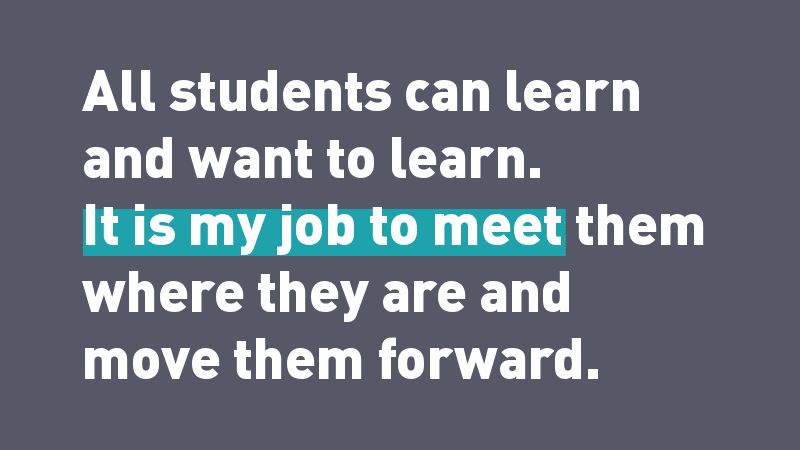Critical Teaching Manifesto
I am a firm believer that Education is more than simply academic. Education is all about helping students to find themselves, and using classroom materials that assist students shaping their beliefs, values, and identities. Education should empower students and aid them on their journeys to become strong individuals with empathy for others and themselves. Educational systems should be used as tools of support and compassion, and provide a strong foundation for students to grow.
As an Educator, my goal is to ensure I create an inclusive learning environment suited to the needs of all my students, and to create a respectful space in which they feel they can be themselves. I want to emphasize the importance of loving ones’ self and loving others, and use daily affirmations as part of a consistent routine in my classroom, beginning in the ‘set’ portion of each lesson. Examples that promote personal affirmations and reflection include “list three ways in which you have helped yourself today”, “list two things that have made you smile today”, “list five things that you are grateful for”, and “what can I do to make today great?”. None of these questions will be graded, and will be used in a ten-minute frame at the beginning of every class to encourage intentional thoughts and positive self reflection. When students feel comfortable and appreciated, they are more willing to learn and participate in the classroom. Additionally, all students come with their different ways of learning, understanding, and knowing. Their uniqueness is something I am so excited to witness, which is why I want to provide my students with as much creative freedom in the classroom as possible. I want them to take our classroom learnings, teachings, and materials and connect to themselves. For example, writing an argumentative paper about ‘why Season One of Stranger Things is the best of all seasons’, or alternatively, ‘why Shakespeare’s Hamlet is based on my friend group’. Topics like these excite students and allow them to learn while also having fun. I also want to allow my students the opportunities for varying degrees of assignments. Students will be given opportunities to write a paper on the structure of English theatres or create a mini model of Shakespeare’s theatre. My students will be able to paint, draw, write, make videos, etc. Any medium that allows them to explain their understanding of what they have learned is acceptable in my eyes.

I also believe it is absolutely necessary that I use Indigenous ways of knowing and understanding in my classroom. Treaty education is an aspect of education that is vital and cannot be left out. Cree knowledges such as tâpwêwin will be a constant means of understanding in my classroom, as I believe truth-telling and honesty are truly the best policies with my students. Miyo-wîcêhtowin will also be consistency practiced in my classroom, as making good and strong relationships are key when participating in group work and discussions. Of course, wâhkôhtowin and wâh-wîcihitowin will also be important aspects of my lesson plans as I wish for every student of mine to understand how they relate to the land and how they can create meaningful exchanges with one another. My students will be given multiple opportunities to explore how class readings and materials engage with the environment, and will be asked to explain how their individual beliefs and morals intertwine with readings. I want my students to participate in Treaty Walks+ as a class to reflect upon their relation to treaty while also connecting with nature, which I believe should be more present in the classroom. Questions such as “how do you feel represented in this reading / material?”, “in what ways has this material changed your worldview or confirmed it?”, and “in what was have you grown or learned from this reading?” will be regular questions in class reflections and exit slips. I want to teach my students with intention and support, while providing them with the tools they need to think deeper and reflect upon what they have learned in connection to themselves. All of these Cree teachings are vital in everyday life, and are essential in aiding students on their journeys to becoming well-rounded individuals and intentional treaty people.
In summation, I believe that all students are capable of learning, and it is my job as an Educator to ensure that my teaching styles suit their needs in order for them to be successful. It is not the job of the students to understand my ways of teaching; it is my job as their teacher to understand their ways of learning and teach accordingly. I aim to meet students where they are, as they are, and walk with them so they can grow in their individual educational journeys. Lastly, I want my students to understand how to best respect themselves and others, and overall provide the support they need to help them reach their highest potential.